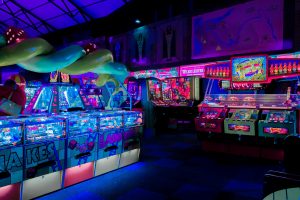By Shay Stinson and Intisar Seraaj
April is National Autism Awareness Month. Working at a therapeutic foster care agency that works with children on the autism spectrum has given us special insight into the needs of people who have autism. One thing the public should be more aware of, especially anyone working with the special needs population, is how people with autism are often sensitive to their environments, whether that’s hyper- or hyposensitivity. Anything affecting their five senses, from touch to sight, can be triggering or disabling and affect how they live daily or carry out ordinary tasks. Thus, living with a sensory processing disorder can be socially isolating. One way to combat this issue is by finding sensory-friendly environments that help people affected by this disorder comfortably acclimate. We’ve aggregated a small list of resources and spaces that are accommodating to the needs of sensory-sensitive customers and families.
Although we’re in quarantine due to the COVID-19 pandemic, we will see “the light of day” soon enough. Similar to those daydreaming about what restaurants they’ll be dining at when the quarantine is over, you might already be planning your next destination, whether it’s a day trip or a full vacation. Either way, if you have family members on the autism spectrum or with a sensory processing disorder, you should keep these places in mind for when we’re all set free again. Post quarantine, these places will be especially important as a way to ease back into having fun in a way that doesn’t overload our senses.
Chuck E. Cheese
On the first Sunday of every month, you can visit Chuck E. Cheese for a Sensory Sensitive Sunday experience. The chain has committed to supporting families with children with autism and other special needs and they offer an environment conducive to the needs of sensory-sensitive players. During the event, the lighting is dimmed, the show music is turned down or turned off completely, there are limited appearances by Chuck E., and families can order off of the full menu. Some great bonuses include free admission with access to all the games and rides for all ages and the siblings of the child(ren) with autism. Call your local Chuck E. Cheese and ask if they offer this event, as it is only available in participating locations.
AMC Theaters
Going to the movies is challenging for anyone nowadays, with crowded theaters, congested parking lots, and confusing assigned seating. It doesn’t keep most of us away though because movies are fun. They are also a great way to socialize and see imagination at work. For sensory sensitive moviegoers, this social tradition is even more challenging, with loud surround sound, super dim lighting, and movie-etiquette expectations to be quiet and sit still. But a partnership between AMC theaters and the Autism Society has created an experience for those on the autism spectrum. According to the AMC website, the Sensory Friendly Film program is available on the second and fourth Saturday (family-friendly) and Wednesday evenings (mature audiences) of every month. Check the list to see if there’s a participating theater near you and check for specific showings and times.
Regal Theaters
AMC is not your preferred theater? That’s OK! Regal Theaters has a similar program called Regal’s My Way Matinee every second and fourth Saturday of the month at 10:30 a.m. The lights are turned up and the volume is turned down and guests are free to express themselves by singing, crying, dancing, walking around, talking, or shouting while enjoying the latest films. Check the list to see which Regal theaters participate near you.
Studio Movie Grill Theaters
Yes, you have one more option for movie-going, and this option includes eating a full course meal while enjoying the film! Its’ Special Needs Screenings are designed for families raising children with special needs. According to the company’s website, these sensory-friendly screenings are free for children with special needs and their siblings. These screenings are available at every Studio Movie Grill, except EpiCentre, and begin at 11 a.m. on select days.
The Arc
Traveling can be stressful, but it can also be fun. The Arc’s Wings for Autism®/Wings for All® (Wings) program works to decrease the stress of people with autism and other special needs (and their families) experience while traveling by air. The program provides an “airport rehearsal,” allowing the opportunity to experience and learn about how youth with special needs might react to different stimuli in the airport. There’s also a presentation on the aircraft features and in-flight safety protocols. There are dozens of these events held per year in various locations, and you can email wingsforautism@thearc.org if you want to bring the program to an airport near you. Once this program is done helping you prepare for the possible stress, you can focus on how you can make flying a bit more fun for your loved one with special needs.
Sky Zone
Sky Zone is already the perfect place for kids and adults to get exercise, blow off steam, team build, and have fun. It features attractions like trampolines, foam pits, rock climbing, and more. Most importantly, it already has plenty of safety features. But even with its safety measures, Sky Zone has sensory hours that provide a quieter, toned-down jumping experience for those with special needs. Find a location near you and ask when its sensory hours are.
YMCA
There are proven neurological, physical, and social benefits to swimming for everyone, but especially for kids with special needs. Some benefits include increased confidence and self-esteem, new cell growth for improved cognitive function, reduced anxiety and stress, improved sleep, and more. According to the National Autism Association, “drowning is among the leading causes of death of individuals with autism,” so it’s also great to have this skill. Check the YMCA’s list for branches of around the nation that offer swim sessions and lessons for sensory-sensitive swimmers.
We hope this list provides some ideas of places that are sensitive to the needs of sensory-sensitive customers and encourages you to research more places in your own community. We suggest calling other local fun places like the zoo, theatres, and ice cream parlors to see if they also have days and programs centered around people with autism or other special needs or with a sensory processing disorder. For more ideas, look at this list of sensory-friendly activities organized by states.






